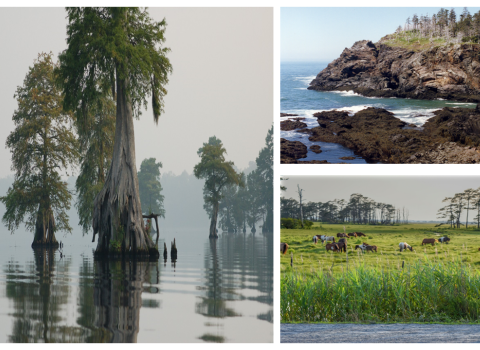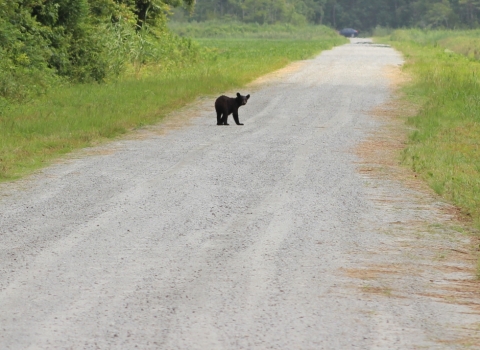Vieques, Puerto Rico – What was that? Mitsuka Bermudez recognized the sound – but no, that wasn’t possible.
Chainsaws? Already?
Hurricane Maria had hardly passed over the small island of Vieques, which is about 10 miles east of Puerto Rico. The land, normally in the full green of early fall, was brown, trees stripped of leaves. The town of Vieques was dark, the houses in the hills just as dark.
And the trees! Everywhere, trees that had stood for decades, some for centuries, lay in huge tangles. Roads were impassable, houses damaged or destroyed.
Bermudez, who was born on this island, knew: Help would come, because towns on the edge of the sea are accustomed to nature’s cruelty. But aid wouldn’t come immediately.
Then she heard the rasp of metal against wood, the high-revving whine of chainsaws. It was, she thought, almost a miracle.
It was a crew from the U.S. Fish and Wildlife Service (Service), dispatched as soon as possible to take the first steps in what will be a long journey for Vieques and the rest of Puerto Rico. The island was one of the first items on a long checklist the Service compiled to help Puerto Rico and the U.S. Virgin Islands, both U.S. territories and the homes of wildlife refuges and national forests.
A task that couldn’t be delayed: clearing roads. Trucks with water and food needed them to reach people cut off from aid. Bermudez marveled as guys with chainsaws cleared the pavement, shoving fallen trees aside.
“It was a funny thing,” said Bermudez, who was born here 51 years ago. “They were the only ones here clearing the paths.”
Among the first, too, to bring water, food, and hope to a region sorely lacking in all three.
Maria arrived, the Service followed
Puerto Rico absorbed a category 4 blow to its midsection when Maria made landfall Sept. 20. Like an overmatched boxer, it staggered, reeled and fell.
Since then, Puerto Rico has risen a little bit each day. An estimated 30 Service workers, staffers from here and from the states, concentrated on communities in Puerto Rico and the U.S Virgin Islands, another American territory.
Service law enforcement got here first, arriving on government planes on Sept. 23, before commercial flights resumed. Officers came from South Florida to check on Service workers, their families and communities. They also turned their attention to other residents, keeping order at a tenuous time.
Other Service workers weren’t far behind. With satellite-phone and chainsaw, with truck and machete, they got things going with the stuff of life: water and MREs (military meals ready to eat), a reassuring smile saying, yes, things will get better.
They came across an 8-year-old girl needing leukemia treatments – her hospital had closed – and got her help.
One officer saw women on the road, loading a car with a daughter’s few possessions. They needed water. He had it. They got it.
A town needed help, some extra cops. The Service helped make that happen.
A bonus: A Service electrician came. If anyone is more popular than an electrician on an island in the dark, let him/her step forward.
“We needed help; they gave it”
Hurricane Maria accomplished what the U.S. Navy never could. For decades, the Navy shelled parts of Vieques in training exercises. To this day, unexploded ordnance makes some segments of the island too dangerous to enter. Vieques even served as a stand-in for Grenada in the 1986 Clint Eastwood film “Heartbreak Ridge.”
Vieques endured all that – artillery, landings, even actors – and life went on. But it wasn’t equal to Maria. In just a few hours, the tempest did what decades of assaults could not: It brought everything to a standstill.
In the days immediately following the hurricane, the deputy mayor of Vieques realized the island was in peril. Thieves had taken all the diesel fuel from the municipal water plant, stopping its pumps, as well as from the local hospital. Without the fuel, the plant and hospital’s generators soon went silent. A grim situation threatened to get worse.
The mayor turned to the Service. Some extra police, he said, would keep the island safe.
The Service, which had dispatched its own law enforcement officers from Miami a few days earlier, passed the word. Working with other agencies, the Service helped get more police on the streets. The thefts diminished.
But police and road crews are only two actors in a drama that will play out for a long time.
Vieques still has no power. Cell phone service is virtually nonexistent. The forests are in shambles; they appear as if a giant stomped them into broken pieces.
But people are getting food and water. The trees are already beginning to turn green again. Cell service and electricity remain on a wish list.
Vieques still has a long way to go – but the distance is shorter than it was.
For Bermudez, the chainsaw gang signaled that life would get better. “We needed help,” she said. “They gave it.”



